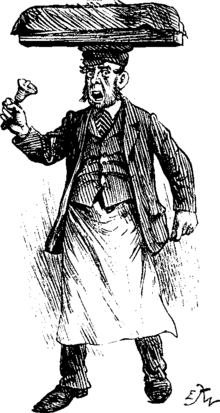Muffin Man
| "The Muffin Man" | |
|---|---|

A muffin man, illustrated in a Punch cartoon from 1892
|
|
| Nursery rhyme | |
| Published | c. 1820 |
"The Muffin Man" is a traditional nursery rhyme or children's song of English origin. It has a Roud Folk Song Index number of 7922.
The most widely known lyrics are as follows:
Do [or "Oh, do"] you know the muffin man,
The muffin man, the muffin man,
Do you know the muffin man,
Who lives in Mulberry Lane?
Yes [or "Oh, yes"], I know the muffin man,
The muffin man, the muffin man,
Yes, I know the muffin man,
Who lives in Mulberry Lane.
The rhyme was first recorded in a British manuscript circa 1820, that is preserved in the Bodleian Library with lyrics very similar to those used today:
Do you know the muffin man?
The muffin man, the muffin man.
Do you know the muffin man
Who lives in Drury Lane?
Victorian households had many of their fresh foods delivered, such as muffins, which were delivered door-to-door by a muffin man. The "muffin" in question was the bread product known in the United States as English muffins, not the much sweeter cupcake-shaped American variety.Drury Lane is a thoroughfare bordering Covent Garden in London.
The rhyme and game appear to have spread to other countries in the mid-nineteenth century, particularly the US and the Netherlands. As with many traditional songs, there are regional variations in wording. Another popular version substitutes "Dorset Lane" for Drury Lane.
In Volume 5 of his contemporary account of the London Prize Ring, Boxiana, published in 1829, Pierce Egan writes of an attempted fix (or "cross") of a match scheduled for October 18, 1825, between Reuben Marten and Jonathan Bissel ("Young Gas"). Young Gas refused to take the bribe and one week later identified the person who offered him £200 to throw the fight as a "Mr. Smith, a muffin-baker in Gray's Inn Lane." Young Gas also identified the "gentlemen" who employed the muffin-baker to act as go between, but those gentlemen denied involvement claiming they did not have "the slightest knowledge of the muffin-man."
Iona and Peter Opie observed that, although the rhyme had remained fairly consistent, the game associated with it has changed at least three times including: as a forfeit game, a guessing game, and a dancing ring.
...
Wikipedia
